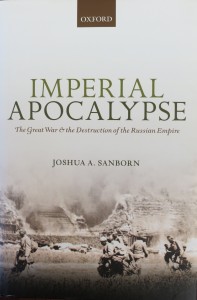Many thanks to Josh for getting back with such wide-ranging elaborations on my, David’s, and John Paul’s original posts. In the interest of keeping things going, let me take up just one of Josh’s points here, hoping to chime in on others as the discussion continues.
On decolonization as a useful frame for understanding of Russia’s Great War: I agree with Josh’s sensible defense of the term in his post on the topic. For all of the unavoidable shapelessness of the concept, “decolonization” as a way of understanding the formal end of empire shouldn’t be thrown out. In fact, if anything, Josh should be credited for bringing this conceptual terminology into our vocabulary on the Russian side.
The great benefit of Josh’s decolonization framework, as David suggested in his post, is that it places the messy, even torturous social politics of empire at the very center of the analysis. We’re used to thinking of the conflict as a contest of imperial alliances and have no trouble citing “nationalism” and “imperialism” among the various “-isms” on our list of the war’s causes. But we’ve done far less to explore the way that Russia’s “empire-ness” – that is, its possibilities and limitations as a sprawling multiethnic society and polity – affected all the dynamics of the time, high and low, including how the country experienced the momentous and ultimately uncontainable upheaval of 1917. Josh gives us a new way to perceive the relationship between empire and the Great War in the Russian context, all of which is a good thing, in my view.
But can one have too much of a good thing? One of the unavoidable perils of a singular provocative thesis is that it overshadows other dynamics and, perhaps unavoidably, takes on its own seemingly unassailable logic. Decolonization – yes, but did the tensions of empire drive everything? The war tested the form of empire that characterized the Russian state at that particular moment, and the white heat of the conflict ultimately proved too much. There is no denying that much — the empire, indeed, cracked apart, not least because Petrograd lost control of huge swaths of the country as the war progressed, including parts of its Central Asian hinterland.
But did “empire” make this so? If Russia hadn’t been the kind of empire it was at the time, couldn’t one argue that the grinding pressures of the conflict, especially when we add the leadership’s clear missteps to the mix, would have been enough to do in the government anyway? That is, “empire” is surely critical. It affects so much on the Russian side, even developments that we might not assume it would. But, for all that, states that are not empires can collapse, too. Perhaps “empire” in regards to the particular question of regime failure, then, is more a question of context than of cause?
On a related note: In his most recent post, Josh suggests – and I agree with him – that the Russian state was stronger than we might think at the start of the war. I’d only add here, amplifying Josh’s view, that it’s helpful to see the imperial state as both strong _and_ weak as the war begins. Obviously, some of the state’s limitations at the time proved to be terribly dangerous ones to expose to what eventually became the first truly “total war” in the country’s history, and these weaknesses took their toll. But I’m not convinced that they were inherent weaknesses of “empire,” even weaknesses of the particular sort of empire that Russia was at the time.
Alongside terrific tensions and seemingly unresolvable “imperial challenges,” Russia’s “empire-ness” also provided the country with abiding solidarities and much-needed resources during the conflict. Perhaps most of all, “empire” was simply the way one did things within Russia’s historical space. As William Appleman Williams might have put it, at the time at least, empire amounted to “a way of life.” [1] And indeed Josh seems to suggest as much himself by reminding us in Imperial Apocalypse of the final stage of decolonization – phase four – the “state-building” phase that actually witnesses the “rebuilding [of] the empire” (258-62), albeit in changed form, under the Bolsheviks.
[1] William Appleman Williams, Empire as a Way of Life: An Essay on the Causes and Character of America’s Present Predicament Along with a Few Thoughts about an Alternative (New York: Oxford University Press, 1980).
